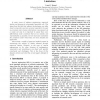Free Online Productivity Tools
i2Speak
i2Symbol
i2OCR
iTex2Img
iWeb2Print
iWeb2Shot
i2Type
iPdf2Split
iPdf2Merge
i2Bopomofo
i2Arabic
i2Style
i2Image
i2PDF
iLatex2Rtf
Sci2ools
104
click to vote
WCRE
2006
IEEE
2006
IEEE
The Experimental Paradigm in Reverse Engineering: Role, Challenges, and Limitations
In many areas of software engineering, empirical studies are playing an increasingly important role. This stems from the fact that software technologies are often based on heuristics and are moreover expected to be used in processes where human intervention is paramount. As a result, not only it is important to assess their costeffectiveness under conditions that are as realistic and representative as possible, but we must also understand the conditions under which they are more suitable and applicable. There exists a wealth of empirical methods aimed at maximizing the validity of results obtained through empirical studies. However, in the case of reverse engineering, as for other domains of investigation, researchers and practitioners are faced with specific constraints and challenges. This is the focus of this keynote address and what the current paper attempts to clarify.
Related Content
| Added | 12 Jun 2010 |
| Updated | 12 Jun 2010 |
| Type | Conference |
| Year | 2006 |
| Where | WCRE |
| Authors | Lionel C. Briand |
Comments (0)

